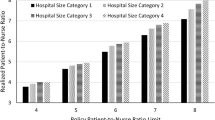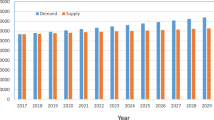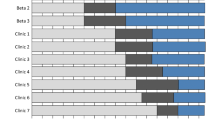Abstract
The Accreditation Council for Graduate Medical Education (ACGME) implemented work hour restrictions for physicians in training in 2003 that were revised July 1, 2011. Current published data are insufficient to assess whether such work hour restrictions will have long-term impact on residents’ education. We searched computer-generated reports of hospital in-patient census, continuity clinic census, in-training exam scores and first-year resident attendance at educational conferences for the academic years 2010–2011 (August 1, 2010—May 31, 2011) and 2011–2013 (August 1, 2011—May 31, 2013). During the first year of the study period, the residents’ inpatient internal medicine services admitted 1,754 patients; during this same period for academic years 2011–2012 and 2012–2013, the teaching services admitted 1,539 and 1,428 patients respectively, yielding a decrease of 16.4 %. Monthly, these services cared for a mean of 27.1 (27.1/175.4 [15.4 %]) fewer patients and 9.7 (9.7/34.4 [28.2 %]) fewer patients per intern than in the previous year. No statistical difference was observed regarding continuity clinic attendance and in-training exam scores. Residents in the years following work hours restrictions attended more educational conferences. Implementation of 2011 ACGME work hour regulations resulted in fewer patients seen by first-year residents in hospital, but did not affect in-training exam scores. Whether these findings will translate into differences in patient outcomes, and quality of care remains to be seen.

Similar content being viewed by others
Abbreviations
- ACGME:
-
Accreditation Council for Graduate Medical Education
- PGY1:
-
Postgraduate year 1
- ITE:
-
In-training exam
References
Alpert, J. S., & Frishman, W. H. (2012). A bridge too far: A critique of the new ACGME duty hour requirements. American Journal of Medicine, 125, 1–2.
Charap, M. (2004). Reducing resident work hours: Unproven assumptions and unforeseen outcomes. Annals of Internal Medicine, 140, 814–815.
Cowie, C. J., Pesic-Smith, J. D., Boukas, A., & Nelson, R. J. (2013). Has the impact of the working time regulations changed neurosurgical trainees’ attitudes toward the european working time directive 5 years on? British Journal of Neurosurgery, 27, 580–585.
Durkin, E. T., McDonald, R., Munoz, A., & Mahvi, D. (2008). The impact of work hour restrictions on surgical resident education. Journal of Surgical Education, 65, 54–60.
Emanuel, E. J., & Fuchs, V. R. (2012). Shortening medical training by 30 %. JAMA, 307, 1143–1144.
Fletcher, K. E., Underwood, W., 3rd, Davis, S. Q., Mangrulkar, R. S., McMahon, L. F., Jr, & Saint, S. (2005). Effects of work hour reduction on residents’ lives: A systematic review. JAMA, 294, 1088–1100.
Goddard, A. F. (2008). Progress on the european working time directive (EWTD) and new deal negotiations. Clinical Medicine, 11, 420–421.
Hutter, M. M., Kellogg, K. C., Ferguson, C. M., Abbott, W. M., & Warshaw, A. L. (2006). The impact of the 80-hour resident workweek on surgical residents and attending surgeons. Annals of Surgery, 243, 864–871.
Institute of Medicine, Committee on Quality of Health Care in America. (2000). To err is human: Building a safer health system. Washington (DC): National Academies Press.
Irani, J. L., Mello, M. M., Ashley, S. W., Whang, E. E., Zinner, M. J., & Breen, E. (2005). Surgical residents’ perceptions of the effects of the ACGME duty hour requirements 1 year after implementation. Surgery, 138, 246–253.
Jamal, M. H., Rousseau, M. C., Hanna, W. C., Doi, S. A., Meterissian, S., & Snell, L. (2011). Effect of the ACGME duty hours restrictions on surgical residents and faculty: A systematic review. Academic Medicine, 86, 34–42.
Landrigan, C. P., Fahrenkopf, A. M., Lewin, D., Sharek, P. J., Barger, L. K., Eisner, M., et al. (2008). Effects of the accreditation council for graduate medical education duty hour limits on sleep, work hours, and safety. Pediatrics, 122, 250–258.
Landrigan, C. P., Rothschild, J. M., Cronin, J. W., Kaushal, R., Burdick, E., Katz, J. T., et al. (2004). Effect of reducing interns’ work hours on serious medical errors in intensive care units. New England Journal of Medicine, 351, 1838–1848.
McLean, T. R. (2005). The 80-hour work week: why safer patient care will mean more health care is provided by physician extenders. Journal of Legal Medicine, 26, 339–384.
Moonesinghe, S. R., Lowery, J., Shahi, N., Millen, A., & Beard, J. D. (2011). Impact of reduction in working hours for doctors in training on postgraduate medical education and patients’ outcomes: Systematic review. BMJ, 342, d1580.
Myers, J. S., Bellini, L. M., Morris, J. B., Graham, D., Katz, J., Potts, J. R., et al. (2006). Internal medicine and general surgery residents’ attitudes about the ACGME duty hours regulations: a multicenter study. Academic Medicine, 81, 1052–1058.
Nasca, T. J., Day, S. H., & Amis, E. S., Jr. (2010). ACGME duty hour task force. The new recommendations on duty hours from the ACGME task force. New England Journal of Medicine, 363, e3.
National Research Council, Committee on Optimizing Graduate Medical Trainee (Resident) Hours and Work Schedule to Improve Patient Safety. (2009). Resident duty hours: Enhancing sleep, supervision, and safety. Washington, DC: National Academies Press.
Pellegrini, V. D., Jr. (2012). Perspective: ten thousand hours to patient safety, sooner or later. Academic Medicine, 87, 164–167.
Philibert, I., Friedmann, P., & Williams, W. T. (2000). ACGME work group on resident duty hours. Accreditation Council for Graduate Medical Education: New requirements for resident duty hours. JAMA, 288, 1112–1114.
Press, M. J., Silber, J. H., Rosen, A. K., Romano, P. S., Itani, K. M., Zhu, J., et al. (2011). The impact of resident duty hour reform on hospital readmission rates among Medicare beneficiaries. Journal of General Internal Medicine, 26, 405–411.
Richter, A., Kostova, P., Baur, X., & Wegner, R. (2014). Less work: More burnout? A comparison of working conditions and the risk of burnout by German physicians before and after the implementation of the EU working time directive. International Archives of Occupational and Environmental Health, 87, 205–215.
Shetty, K. D., & Bhattacharya, J. (2007). Changes in hospital mortality associated with residency work-hour regulations. Annals of Internal Medicine, 147, 73–80.
Swide, C. E., & Kirsch, J. R. (2007). Duty hours restriction and their effect on resident education and academic departments: The American perspective. Current Opinion in Anesthesiology, 20, 580–584.
Thanarajasingam, U., McDonald, F. S., Halvorsen, A. J., Naessens, J. M., Cabanela, R. L., Johnson, M. G., et al. (2012). Service census caps and unit-based admissions: Resident workload, conference attendance, duty hour compliance, and patient safety. Mayo Clinic Proceedings, 87, 320–327.
Volpp, K. G., Rosen, A. K., Rosenbaum, P. R., Romano, P. S., Even-Shoshan, O., Wang, Y., et al. (2007). Mortality among hospitalized medicare beneficiaries in the first 2 years following ACGME resident duty hour reform. JAMA, 298, 975–983.
Volpp, K. G., Rosen, A. K., Rosenbaum, P. R., Romano, P. S., Itani, K. M., Bellini, L., et al. (2009). Did duty hour reform lead to better outcomes among the highest risk patients? Journal of General Internal Medicine, 24, 1149–1155.
Conflict of interest
None.
Author information
Authors and Affiliations
Corresponding author
Rights and permissions
About this article
Cite this article
Vucicevic, D., Mookadam, F., Webb, B.J. et al. The impact of 2011 ACGME duty hour restrictions on internal medicine resident workload and education. Adv in Health Sci Educ 20, 193–203 (2015). https://doi.org/10.1007/s10459-014-9525-5
Received:
Accepted:
Published:
Issue Date:
DOI: https://doi.org/10.1007/s10459-014-9525-5




